Lev Kurilenko
Universal Checkpointing: Efficient and Flexible Checkpointing for Large Scale Distributed Training
Jun 27, 2024



Abstract:Existing checkpointing approaches seem ill-suited for distributed training even though hardware limitations make model parallelism, i.e., sharding model state across multiple accelerators, a requirement for model scaling. Consolidating distributed model state into a single checkpoint unacceptably slows down training, and is impractical at extreme scales. Distributed checkpoints, in contrast, are tightly coupled to the model parallelism and hardware configurations of the training run, and thus unusable on different configurations. To address this problem, we propose Universal Checkpointing, a technique that enables efficient checkpoint creation while providing the flexibility of resuming on arbitrary parallelism strategy and hardware configurations. Universal Checkpointing unlocks unprecedented capabilities for large-scale training such as improved resilience to hardware failures through continued training on remaining healthy hardware, and reduced training time through opportunistic exploitation of elastic capacity. The key insight of Universal Checkpointing is the selection of the optimal representation in each phase of the checkpointing life cycle: distributed representation for saving, and consolidated representation for loading. This is achieved using two key mechanisms. First, the universal checkpoint format, which consists of a consolidated representation of each model parameter and metadata for mapping parameter fragments into training ranks of arbitrary model-parallelism configuration. Second, the universal checkpoint language, a simple but powerful specification language for converting distributed checkpoints into the universal checkpoint format. Our evaluation demonstrates the effectiveness and generality of Universal Checkpointing on state-of-the-art model architectures and a wide range of parallelism techniques.
Phi-3 Technical Report: A Highly Capable Language Model Locally on Your Phone
Apr 23, 2024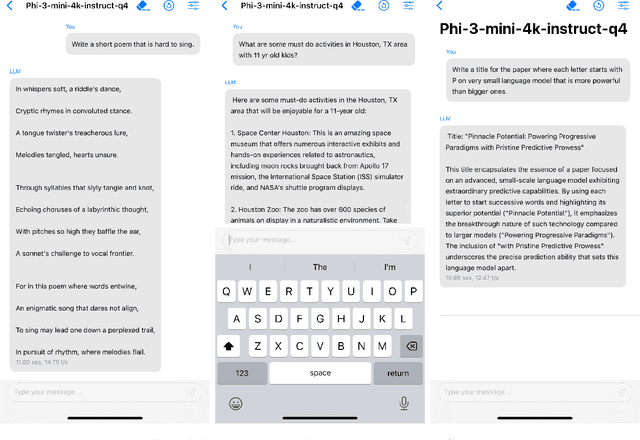

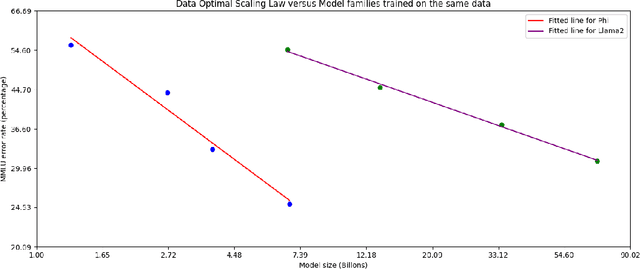
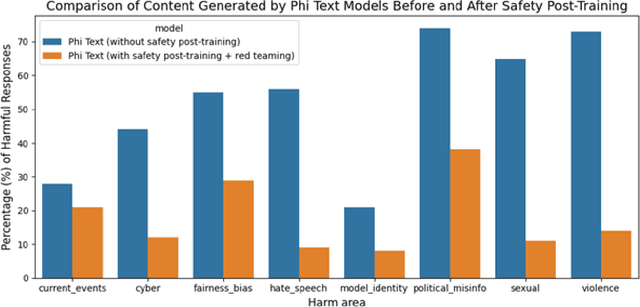
Abstract:We introduce phi-3-mini, a 3.8 billion parameter language model trained on 3.3 trillion tokens, whose overall performance, as measured by both academic benchmarks and internal testing, rivals that of models such as Mixtral 8x7B and GPT-3.5 (e.g., phi-3-mini achieves 69% on MMLU and 8.38 on MT-bench), despite being small enough to be deployed on a phone. The innovation lies entirely in our dataset for training, a scaled-up version of the one used for phi-2, composed of heavily filtered web data and synthetic data. The model is also further aligned for robustness, safety, and chat format. We also provide some initial parameter-scaling results with a 7B and 14B models trained for 4.8T tokens, called phi-3-small and phi-3-medium, both significantly more capable than phi-3-mini (e.g., respectively 75% and 78% on MMLU, and 8.7 and 8.9 on MT-bench).
DeepSpeed-FastGen: High-throughput Text Generation for LLMs via MII and DeepSpeed-Inference
Jan 09, 2024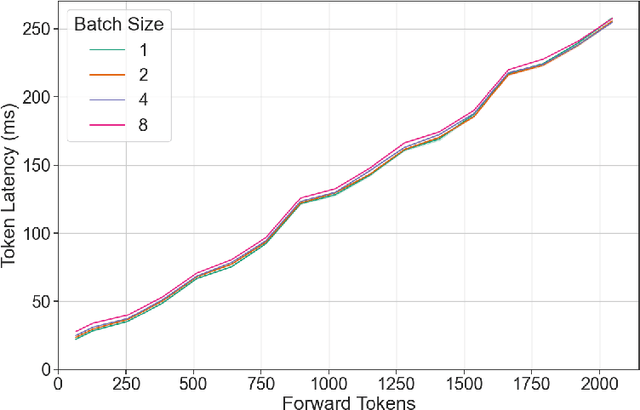
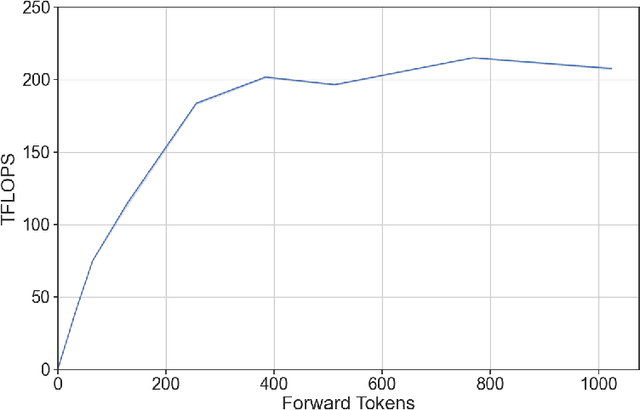
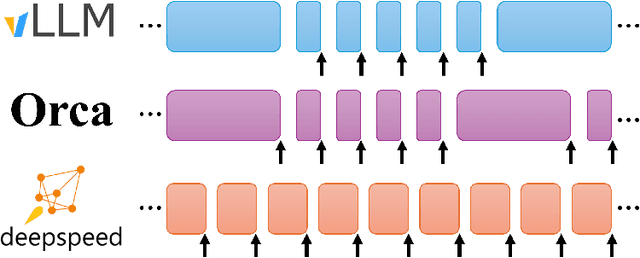

Abstract:The deployment and scaling of large language models (LLMs) have become critical as they permeate various applications, demanding high-throughput and low-latency serving systems. Existing frameworks struggle to balance these requirements, especially for workloads with long prompts. This paper introduces DeepSpeed-FastGen, a system that employs Dynamic SplitFuse, a novel prompt and generation composition strategy, to deliver up to 2.3x higher effective throughput, 2x lower latency on average, and up to 3.7x lower (token-level) tail latency, compared to state-of-the-art systems like vLLM. We leverage a synergistic combination of DeepSpeed-MII and DeepSpeed-Inference to provide an efficient and easy-to-use serving system for LLMs. DeepSpeed-FastGen's advanced implementation supports a range of models and offers both non-persistent and persistent deployment options, catering to diverse user scenarios from interactive sessions to long-running applications. We present a detailed benchmarking methodology, analyze the performance through latency-throughput curves, and investigate scalability via load balancing. Our evaluations demonstrate substantial improvements in throughput and latency across various models and hardware configurations. We discuss our roadmap for future enhancements, including broader model support and new hardware backends. The DeepSpeed-FastGen code is readily available for community engagement and contribution.
DeepSpeed-Chat: Easy, Fast and Affordable RLHF Training of ChatGPT-like Models at All Scales
Aug 02, 2023
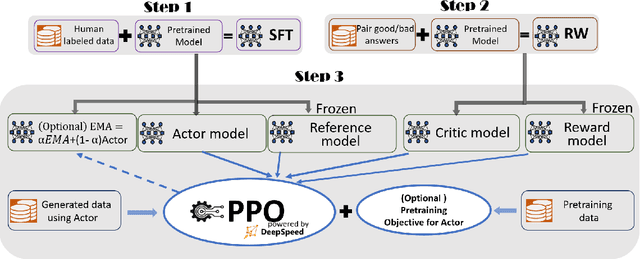

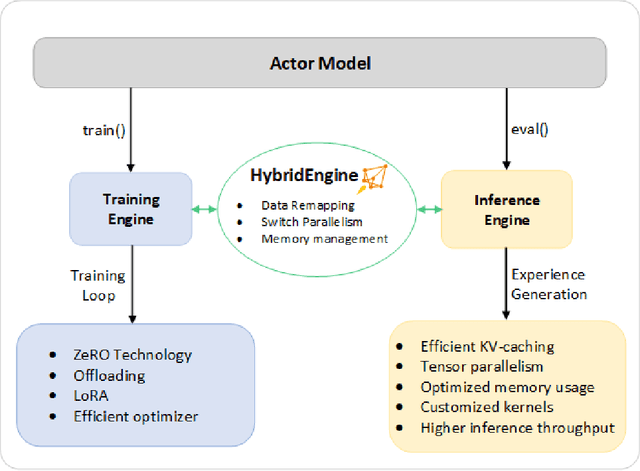
Abstract:ChatGPT-like models have revolutionized various applications in artificial intelligence, from summarization and coding to translation, matching or even surpassing human performance. However, the current landscape lacks an accessible, efficient, and cost-effective end-to-end RLHF (Reinforcement Learning with Human Feedback) training pipeline for these powerful models, particularly when training at the scale of billions of parameters. This paper introduces DeepSpeed-Chat, a novel system that democratizes RLHF training, making it accessible to the AI community. DeepSpeed-Chat offers three key capabilities: an easy-to-use training and inference experience for ChatGPT-like models, a DeepSpeed-RLHF pipeline that replicates the training pipeline from InstructGPT, and a robust DeepSpeed-RLHF system that combines various optimizations for training and inference in a unified way. The system delivers unparalleled efficiency and scalability, enabling training of models with hundreds of billions of parameters in record time and at a fraction of the cost. With this development, DeepSpeed-Chat paves the way for broader access to advanced RLHF training, even for data scientists with limited resources, thereby fostering innovation and further development in the field of AI.
 Add to Chrome
Add to Chrome Add to Firefox
Add to Firefox Add to Edge
Add to Edge